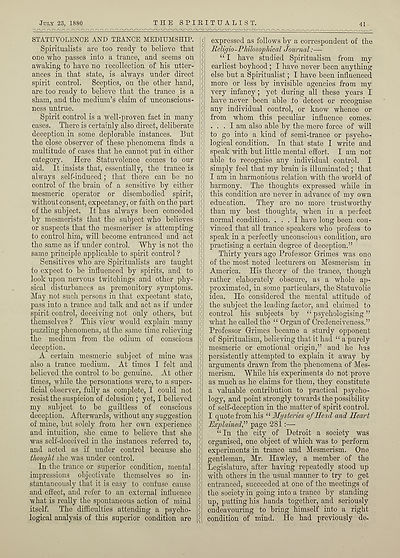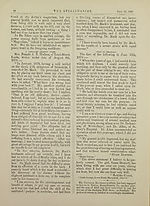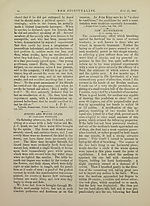Download files
Complete book:
Individual page:
Thumbnail gallery: Grid view | List view

July 23, 1880
THE 3PIKITUALIST.
41
STATUYOLENOE AND TEANCE MEDIUMSHIP.
Spiritualists are too ready to believe that
one who passes into a trance, and seems on
awaking to have no recollection of his utter¬
ances in that state, is always under direct
spirit control. Sceptics, on the other hand,
are too ready to believe that the trance is a
sham, and the medium’s claim of unconscious¬
ness untrue.
Spirit control is a well-proven fact in many
cases. There is certainly also direct, deliberate
deception in some deplorable instances. But
the close observer of these phenomena finds a
multitude of cases that he cannot put in either
category. Here Statuvolence comes to our
aid. It insists that, essentially, the trance is
always self-induced; that there can be no
control of the brain of a sensitive by either
mesmeric operator or disembodied spirit,
without consent, expectancy, or faith on the part
of the subject. It has always been conceded
by mesmerists that the subject who believes
or suspects that the mesmeriser is attempting
to control him, will become entranced and act
the same as if under control. Why is not the
same principle applicable to spirit control ?
Sensitives who are Spiritualists are taught
to expect to be influenced by spirits, and to
look upon nervous twitchings and other phy¬
sical disturbances as premonitory symptoms.
May not such persons in that expectant state,
pass into a trance and talk and act as if under
spirit control, deceiving not only others, but
themselves ? This view would explain many
puzzling phenomena, at the same time relieving
the medium from the odium of conscious
deception.
A certain mesmeric subject of mine was
also a trance medium. At times I felt and
believed the control to be genuine. At other
times, while the personations were, to a super¬
ficial observer, fully as complete, I could not
resist the suspicion of delusion ; yet, I believed
my subject to be guiltless of conscious
deception. Afterwards, without any suggestion
of mine, but solely from her own experience
and intuition, she came to believe that she
was self-deceived in the instances referred to,
and acted as if under control because she
thought she was under control.
In the trance or superior condition, mental,
impressions objectivate themselves so in¬
stantaneously that it is easy to confuse cause
and effect, and refer to an external influence
what is really the spontaneous action of mind
itself. The difficulties attending a psycho¬
logical analysis of this superior condition are
j<j expressed as follo ws by a correspondent of the
| | Religio-Philosophical Journal:—
|>| u I have studied Spiritualism from my
If earliest boyhood; I have never been anything
K else but a Spiritualist; I have been influenced
|(| more or less by invisible agencies from my
I?! very infancy ; yet during all these years I
> have never been able .to detect or recognise
Kl any individual control, or know whence or
R| from whom this peculiar influence comes,
j)! ... I am also able by the mere force of will
jsj to go into a kind of semi-trance or psycho-
1 | logical condition. In that state I write and
!<| speak with but little mental effort. I am not
ij able to recognise any individual control. I
| simply feel that my brain is illuminated ; that
i I am in harmonious relation with the world of
I harmony. The thoughts expressed while in
\A this condition are never in advance of my own
ISj education. They are no more trustworthy
k! than my best thoughts, when in a perfect
? normal condition. ... I have long been con-
|)i vinced that all trance speakers who profess to
Kj speak in a perfectly unconscious condition, are
K practising a certain degree of deception.”
Thirty years ago Professor Grimes was one
> of the most noted lecturers on Mesmerism in
America. His theory of the trance, though
I1’j rather elaborately obscure, as a whole ap-
j. proximated, in some particulars, the Statuvolic
| idea. He considered the mental attitude of
| the subject the leading factor, and claimed to
I control his subjects by u psychologising ”
| what he called the u Organ of Credenciveness.”
| Professor Grimes became a sturdy opponent
Kj of Spiritualism, believing that it had “ a purely
m mesmeric or emotional origin,” and he has
j)j persistently attempted to explain it away by
hi arguments drawn from the phenomena of Mes-
j j merism. While his experiments do not prove
j<| as much as he claims for them, they constitute
j?j a valuable contribution to practical psycho-
j)j logy, and point strongly towards the possibility
jsj of self-deception in the matter of spirit control.
\h I quote from his “ Mysteries of Head and Heart
j)j Explainedf page 281:—
“ In the city of Detroit a society was
Kj organised, one object of which was to perform
j experiments in trance and Mesmerism. One
!>! gentleman, Mr. Hawley, a member of the
| j Legislature, after having repeatedly stood up
jsj with others in the usual manner to try to get
j(| entranced, succeeded at one of the meetings of
Pj the society in going into a trance by standing
j up, putting his hands together, and seriously
Kj endeavouring to bring himself into a right
\\\ condition of mind. He had previously de-
THE 3PIKITUALIST.
41
STATUYOLENOE AND TEANCE MEDIUMSHIP.
Spiritualists are too ready to believe that
one who passes into a trance, and seems on
awaking to have no recollection of his utter¬
ances in that state, is always under direct
spirit control. Sceptics, on the other hand,
are too ready to believe that the trance is a
sham, and the medium’s claim of unconscious¬
ness untrue.
Spirit control is a well-proven fact in many
cases. There is certainly also direct, deliberate
deception in some deplorable instances. But
the close observer of these phenomena finds a
multitude of cases that he cannot put in either
category. Here Statuvolence comes to our
aid. It insists that, essentially, the trance is
always self-induced; that there can be no
control of the brain of a sensitive by either
mesmeric operator or disembodied spirit,
without consent, expectancy, or faith on the part
of the subject. It has always been conceded
by mesmerists that the subject who believes
or suspects that the mesmeriser is attempting
to control him, will become entranced and act
the same as if under control. Why is not the
same principle applicable to spirit control ?
Sensitives who are Spiritualists are taught
to expect to be influenced by spirits, and to
look upon nervous twitchings and other phy¬
sical disturbances as premonitory symptoms.
May not such persons in that expectant state,
pass into a trance and talk and act as if under
spirit control, deceiving not only others, but
themselves ? This view would explain many
puzzling phenomena, at the same time relieving
the medium from the odium of conscious
deception.
A certain mesmeric subject of mine was
also a trance medium. At times I felt and
believed the control to be genuine. At other
times, while the personations were, to a super¬
ficial observer, fully as complete, I could not
resist the suspicion of delusion ; yet, I believed
my subject to be guiltless of conscious
deception. Afterwards, without any suggestion
of mine, but solely from her own experience
and intuition, she came to believe that she
was self-deceived in the instances referred to,
and acted as if under control because she
thought she was under control.
In the trance or superior condition, mental,
impressions objectivate themselves so in¬
stantaneously that it is easy to confuse cause
and effect, and refer to an external influence
what is really the spontaneous action of mind
itself. The difficulties attending a psycho¬
logical analysis of this superior condition are
j<j expressed as follo ws by a correspondent of the
| | Religio-Philosophical Journal:—
|>| u I have studied Spiritualism from my
If earliest boyhood; I have never been anything
K else but a Spiritualist; I have been influenced
|(| more or less by invisible agencies from my
I?! very infancy ; yet during all these years I
> have never been able .to detect or recognise
Kl any individual control, or know whence or
R| from whom this peculiar influence comes,
j)! ... I am also able by the mere force of will
jsj to go into a kind of semi-trance or psycho-
1 | logical condition. In that state I write and
!<| speak with but little mental effort. I am not
ij able to recognise any individual control. I
| simply feel that my brain is illuminated ; that
i I am in harmonious relation with the world of
I harmony. The thoughts expressed while in
\A this condition are never in advance of my own
ISj education. They are no more trustworthy
k! than my best thoughts, when in a perfect
? normal condition. ... I have long been con-
|)i vinced that all trance speakers who profess to
Kj speak in a perfectly unconscious condition, are
K practising a certain degree of deception.”
Thirty years ago Professor Grimes was one
> of the most noted lecturers on Mesmerism in
America. His theory of the trance, though
I1’j rather elaborately obscure, as a whole ap-
j. proximated, in some particulars, the Statuvolic
| idea. He considered the mental attitude of
| the subject the leading factor, and claimed to
I control his subjects by u psychologising ”
| what he called the u Organ of Credenciveness.”
| Professor Grimes became a sturdy opponent
Kj of Spiritualism, believing that it had “ a purely
m mesmeric or emotional origin,” and he has
j)j persistently attempted to explain it away by
hi arguments drawn from the phenomena of Mes-
j j merism. While his experiments do not prove
j<| as much as he claims for them, they constitute
j?j a valuable contribution to practical psycho-
j)j logy, and point strongly towards the possibility
jsj of self-deception in the matter of spirit control.
\h I quote from his “ Mysteries of Head and Heart
j)j Explainedf page 281:—
“ In the city of Detroit a society was
Kj organised, one object of which was to perform
j experiments in trance and Mesmerism. One
!>! gentleman, Mr. Hawley, a member of the
| j Legislature, after having repeatedly stood up
jsj with others in the usual manner to try to get
j(| entranced, succeeded at one of the meetings of
Pj the society in going into a trance by standing
j up, putting his hands together, and seriously
Kj endeavouring to bring himself into a right
\\\ condition of mind. He had previously de-
Set display mode to:
![]() Universal Viewer |
Universal Viewer | ![]() Mirador |
Large image | Transcription
Mirador |
Large image | Transcription
Images and transcriptions on this page, including medium image downloads, may be used under the Creative Commons Attribution 4.0 International Licence unless otherwise stated. ![]()
| The Spiritualist > The Spiritualist newspaper > No.413, July 23rd 1880 > (7) |
|---|
| Permanent URL | https://digital.nls.uk/137204454 |
|---|
| Attribution and copyright: |
|
|---|---|
| Shelfmark | P.20 |
|---|---|
| Additional NLS resources: |

